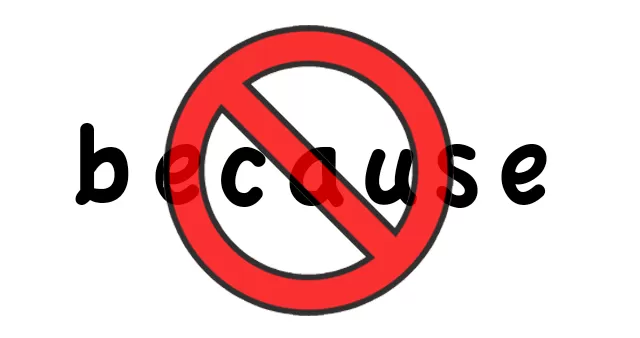- +(65) 6018 5957
- [email protected]

No products in the cart.

12 Ways To Replace The Word ‘BECAUSE’

Many words or phrases can be used to set up an explanation. The most common and really REALLY overused one is “because”. Please encourage your child to stop using that word in his school compositions if he wants to score a little bit higher.
Here are 12 alternatives to replace “because” and their merits.
“As” is a direct synonym for “because” (for example, “He decided not to go see the movie, as he found out his nemesis was going as well”), but it’s not exactly much better.
2. AS A RESULT OF
This phrase is a substitute for “because of”, not because, as in “As a result of his insatiable appetite, all the dishes on the table were wiped clean within seconds.”
3. AS LONG AS
This informal equivalent of “because” is used to express the thought that given that one thing is occurring or will occur or is true, another is possible, in such statements as “As long as you’re going to the supermarket, could you help me buy 5 watermelons?”
4. BEING AS (OR BEING AS HOW OR BEING THAT)
This phrase has the same sense — and the same formality — as “as long as”.
5. CONSIDERING THAT
This phrase is essentially identical in meaning to “as long as” and “being as” and its variants.
This substitute for “because” is reserved for poetic usage, as in “Let us eat and drink, for tomorrow we die.”
7. NOW THAT
This phrase informally connotes cause and effect, as in “Now that Mrs Tan here, we can submit our homework.”
This phrase applies to explanations of emotion or feeling — for example, “She asked out of compassion” or “Out of spite, I refrained from passing the message along.”
9. SEEING THAT
This phrase is identical to “considering that.”
“Since” primarily refers to elapsed time, as in “Since it had rained, we didn’t need to water the garden.”
11. THANKS TO
This equivalent of “because of,” despite the wording, can apply to either a positive or a negative outcome; “Thanks to your involvment, the teacher is now watching our every move” demonstrates the latter sense.
12. THROUGH
Through is a preposition; it takes the place of “because of,” as in “Through the efforts of the teachers, all the students did well in the final year exams.”
For over 15 years, Augustine’s English Classes has helped hundreds of students fall in love with the subject and excelling in school exams. If you are interested to know how our classes work, or what our secret winning formula is, do feel free to drop us a message or give us a call.
Our Registration Is Open For 2023 Classes
Recent articles.

What is the Best Age to Start Primary English Tuition in Singapore?

Is English Tuition Necessary for Primary School Students?

How to Avoid These 7 Spelling Mistakes with English Tuition

How Primary English Tuition Help Your Child’s Reading Skills

Students’ Work: Being Greedy
Like us on facebook.
QUICK LINKS
- (+65) 6018 5957
Marine Parade 86 Marine Parade Central #04-302 Singapore 440086
© Copyright 2024 – MOE Registered English Tuition Centre Singapore Voted #1 English Tuition Class
Connect with
Discover, Learn, Contribute, Connect
How to Say “Because” in an Essay: A Comprehensive Guide
Welcome to our comprehensive guide on how to effectively use the word “because” in your essays. Whether you’re looking for formal or informal ways to convey cause and effect, we’ve got you covered. In this guide, we’ll provide you with tips, examples, and regional variations to help you enhance your essay writing skills while maintaining a warm and engaging tone.
Table of Contents
Formal Ways to Say “Because”
When writing formal essays, it’s essential to use appropriate language to convey your ideas clearly and effectively. Here are a few formal alternatives to using the word “because”:
- Due to: This phrase is commonly used in academic and professional writing to explain cause and effect. For example, “The decrease in sales was due to the new marketing strategy.”
- Owing to: Similar to “due to,” this phrase imparts a sense of formality to your writing. For instance, “The cancellation of the event was owing to unforeseen circumstances.”
- As a result of: This phrase is ideal for directly stating the cause and effect relationship. For instance, “As a result of the excessive rainfall, the river flooded.”
- Since: While “since” can be used in an informal context, it also works well when expressing cause and effect in a formal essay. For example, “Since the implementation of new policies, crime rates have significantly decreased.”
Informal Ways to Say “Because”
If you’re writing an essay in a more informal style or for non-academic purposes, you may want to use less formal alternatives to convey your ideas. Here are a few examples:
- Since: As mentioned earlier, “since” can be used in a less formal context as well. For instance, “I couldn’t attend the concert since I had a prior commitment.”
- As: This word can be used to show cause and effect while maintaining a conversational tone. For example, “I couldn’t finish the project on time as I faced technical difficulties.”
- Seeing as: This phrase is more colloquial and can replace “because” in a relaxed setting. For instance, “I decided to cook dinner myself, seeing as my roommate was busy.”
- Due to: Though commonly used formally, “due to” can also be used in a less formal context. For example, “We couldn’t go to the beach due to the heavy rain.”
Regional Variations in Saying “Because”
While the main focus of this guide is on formal and informal alternatives to saying “because,” it’s worth noting that there can be regional variations as well. Here are a few examples:
Since: In American English, “since” is used more casually, not only to denote cause and effect but also to indicate a time frame. For example, “I haven’t seen her since last week.”
Remember to choose alternatives that align with the context and tone of your essay, whether it’s formal, informal, or influenced by regional variations.
Tips for Using Alternatives to “Because”
To ensure your essay flows smoothly and effectively when using alternatives to “because,” here are some tips to keep in mind:
- Consider the formality of your essay and choose alternatives accordingly.
- Ensure that your chosen alternative accurately reflects the cause and effect relationship.
- Use appropriate punctuation when introducing alternatives to maintain clarity.
- Try to vary your word choice to keep your writing engaging and avoid repetition.
By following these tips, you can effectively incorporate alternatives to “because” and enhance the overall quality of your essay.
Congratulations! You are now equipped with a range of formal and informal alternatives to the word “because.” Remember to carefully consider the context of your essay and choose the most suitable alternative that aligns with your desired tone. By doing so, you will enhance the clarity and effectiveness of your writing. Now, go ahead and craft compelling essays using a diverse range of cause-and-effect phrases.
Happy essay writing!
Related Guides:
- Guide on How to Say a Title in an Essay
- How to Say “As Previously Mentioned” in an Essay
- How to Say “Essay” in Different Ways: Formal and Informal Variations
- Guide on How to Say “Going Back to” in an Essay
- Guide: How to Say “I Agree” in an Essay
- Guide on How to Say No to Drugs Essay
- How to Emphasize Importance in an Essay
- How to Say “We” in an Essay: Formal and Informal Ways
About The Author
Clyde Brian

30 Alternatives to Replace the Word ‘Because’
When writing for school, it is a good idea to use different words to make essays more interesting and effective. Relying too much on the connector "because" can make writing seem repetitive. Encouraging your child to use a variety of expressions instead of "because" can help them do better in their schoolwork. Here are 30 different alternatives that can be used in place of "because." Each of these provides a fresh way to explain reasons or causes, making their writing more varied and engaging.

A simple, often poetic substitute, e.g., "People are motivated to do things for their loved ones."
Direct and concise, e.g., "As it's raining, the game is called off."
Denotes time and causation, e.g., "Since it was late, we decided to leave."
Implies a direct cause, e.g., "The cancellation was due to bad weather."

5. Owing to
Similar to "due to", e.g., "Owing to the rain, the match was postponed."
6. By virtue of
Indicates causation due to a particular fact, e.g., "By virtue of her high score, she won the scholarship."
Indicates causation, typically used with efforts or processes, e.g., "Through hard work, he succeeded."
8. Thanks to
Can indicate positive or negative causation, e.g., "Thanks to her efforts, the project succeeded."
9. Following
Implies consequence or following action, e.g., "Following your advice, I changed my plans."
10. On account of
Assigns a reason, e.g., "On account of his expertise, he was chosen for the job."
11. Attributable to
Denotes direct causality, often in formal contexts, e.g., "The success was attributable to teamwork."
12. In the light of
Used to introduce influencing factors, e.g., "In the light of recent events, we need to be cautious."
13. Considering
Similar to "in the light of", e.g., "Considering the circumstances, his decision was justified."
14. Stems from
Indicates the origin or cause, e.g., "His fear stems from a past incident."
Applies to actions motivated by emotion or feeling, e.g., "She helped him out of compassion."
16. Given that
Presents a fact or situation as a reason, e.g., "Given that it's already midnight, let's go home."
Indicates following instructions or information, e.g., "As per the instructions, we proceeded with the plan."
18. Now that
Informally connotes cause and effect, e.g., "Now that you are here, we can start."
19. Seeing that
Similar to "considering that," e.g., "Seeing that it's raining, we'll stay inside."
20. Regarding
Similar to "in the light of", it is used to introduce a topic or subject under discussion, e.g., "We have updated the directors regarding your concerns."
21. By reason of
A formal way of giving a reason, e.g., "He was exempted by reason of his age."
22. In response to
Indicates a reaction to something, e.g., "In response to your request, we have updated the file."
23. On the basis of
Indicates the foundation or reason for something, e.g., "He was chosen on the basis of his experience."
24. On the grounds of
Used to provide a basis or reason, e.g., "He was convicted on the grounds of irrefutable evidence."
25. On the strength of
Indicates reliance on something, e.g., "On the strength of his promise, I lent him the money."
26. Resulting from
Emphasises the outcome of an action, e.g., "Resulting from his investigation, new facts were uncovered."
27. Consequently
Indicates an outcome, e.g., "He lived a sedentary lifestyle. Consequently, his health deteriorated."
28. As a result of
Points to a consequence of an action, e.g., "As a result of the power failure, the event was delayed."
29. As a consequence of
Highlights the outcome of an action, e.g., "As a consequence of his actions, he was reprimanded."
30. In consequence of
Similar to "as a result of", e.g., "In consequence of his negligence, there was a massive loss."
English and Future Success
Research shows that strong English skills go far beyond the classroom, playing a key role in university 1 and career success 2 . Better English proficiency is not just about grammar and vocabulary; it provides a crucial stepping stone for achieving life goals.

About Mrs Elizabeth Yeo


IMAGES